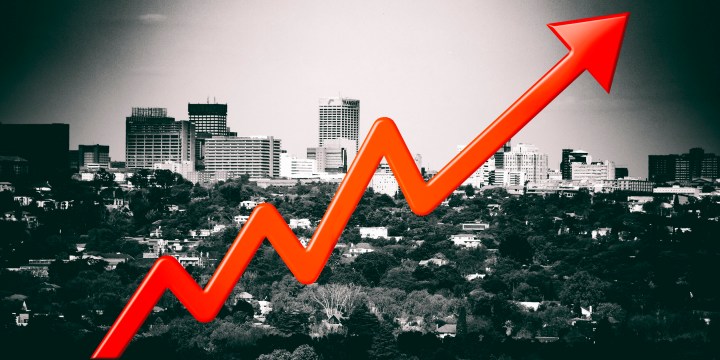REAL ESTATE
‘Excessive’ hikes in municipal rates raise the ire of SA’s biggest property owners

SA’s largest commercial property owners are losing patience over municipalities charging more for services but providing less and less.
The high rates and taxes charged by municipalities across South Africa have riled the country’s largest property owners, who have issued critical warnings about stepping away from large-scale real estate investments if the status quo continues.
Commercial property owners in South Africa’s R4.9-trillion real estate industry have again complained about municipalities hiking property rates and taxes while service delivery in some cities continues to deteriorate. It’s a long-standing issue and property owners are losing patience.
Estienne de Klerk, a director at Growthpoint Properties, has been vocal about perennial inefficiencies with municipalities and “excessive” municipal rate hikes they levy against property owners.
Growthpoint owns a portfolio of properties, including shopping malls, office buildings and warehouses, worth R161-billion, of which R70-billion is in South Africa.
“These costs aren’t only impacting businesses in South Africa but everyone who owns a property in the country. These costs are making South Africa increasingly uncompetitive because people are paying more in rates and taxes but getting less in municipal services,” said De Klerk, adding that commercial property owners were feeling most of the pinch.
This is arguably no alarmist scaremongering. De Klerk estimates that rates and taxes across South Africa, which are charged by municipalities based on property values, have gone up by 11% over the past 10 years on a compounded basis. The consumer inflation rate has averaged about 6% over the same period.
That’s just the increase in rates and taxes that property owners pay to municipalities for the maintenance of roads, street lighting, storm drainage, pavements, refuse, sewerage and firefighting. It excludes water and electricity charges, which are billed separately.
Dipula Income Fund CEO Izak Petersen agrees with De Klerk. He said the increase in rates and taxes had been well above inflation, between 11% and 14% on a compounded basis over the past 10 years. Dipula owns a diversified portfolio of 200 retail, office, industrial and residential properties worth R9.1-billion, across all provinces of South Africa.
Visit Daily Maverick’s home page for more news, analysis and investigations
Worrying picture
Official industry figures paint a more dire picture of property costs, especially when water and electricity charges are included.
The South African Property Owners’ Association (Sapoa) closely monitors property costs and has, in recent years, lobbied for municipal officials to be reasonable in the rates and taxes that they charge property owners.
In Sapoa’s latest report, which tracks property costs, including water and electricity charges, it found they consumed 42% of the total income that property owners generated (mainly from rental income) during the six months ending in June 2022.
In other words, if property owners generate R100 in rental income, about R42 is paid to municipalities. And in the first six months of 2022, total operating costs grew by 11.2% while the income property owners generated lagged, growing by 6.7%.
Property owners paid more money to municipalities than they received in rental income. This trend persisted more than a year ago, as Sapoa figures indicate that property costs increased by 9.6% while rental income grew by 5.7%.
“This is a problem because property owners and landlords are absorbing these costs and not passing them on to tenants. Landlords are becoming less profitable in the process,” said De Klerk.
Growthpoint should know tenant behaviour: it rents space to some of SA’s blue chip companies, including Discovery (its head office in Sandton is valued at R2.4-billion), Anglo American, Absa, MTN, Shoprite and many others. It also owns 50% of the V&A Waterfront in Cape Town.
Dipula’s second-largest line expense is rates and taxes that are due to municipalities.
“It is horrible and we don’t understand why you cannot get a fraction of the service delivery back from municipalities. But you are paying a lot of rates and taxes that you cannot recover from tenants,” Petersen said.
Vicious cycle of costs
It’s a vicious cycle of costs that property owners are shelling out to keep tenants and municipal officials happy. Major metros in South Africa, for example, now require commercial property owners to pay for the expansion and maintenance of provincial roads when they embark on large-scale property developments and future city improvement initiatives.
“That is the job and responsibility of municipalities but they are not doing those things. But we are paying more again for services that we should ordinarily be getting but we are not,” said De Klerk.
There’s also the complexity of water and electricity outages, which are becoming an everyday and permanent fixture. Commercial property owners are now required to provide backup electricity and water measures to tenants at the former’s cost.
Municipalities impose ‘unreasonable costs’
There is also a feeling that municipalities are “unreasonable” in passing rates and utility increases. For example, in 2021, the City of Joburg, which contributes 16% to South Africa’s GDP, imposed a 14.6% hike in electricity prices and a 6.8% hike in water prices.
The city needed to do this to fund its 17.6% salary bill increase, which rose to R14.8-billion and included R660-million in bonuses for the city’s staff. Ideally, rate increases would improve the city’s governance and not consumption measures, such as funding salary increases.
The net effect of the high rates and taxes is that property owners will withhold investments in South Africa or find pockets within the country where there is good service delivery, such as Cape Town.
Sapoa’s research found that the Western Cape has lower property rates and taxes compared with Gauteng and KwaZulu-Natal. Petersen and De Klerk say the high rates and taxes in some cities, especially in Gauteng, will push them to shift investments towards the Western Cape.
“For a start, there won’t be more property developments in Gauteng nodes like Sandton and Rosebank, even Pretoria. There should be no development for the next three to four years. In the office property sector alone, there is a massive oversupply of properties in Gauteng,” said Petersen.
“The shrink in South Africa’s economy won’t lead to the take-up of properties or new leases being signed up over the long term. We would try our investment luck in the Western Cape.”
Quintin Rossi is the CEO of Spear Reit, a property company with office and retail investments in the Western Cape. He said he was happy with the rates and taxes dispensation in the province because the government invested in the province’s infrastructure, paving the way for the company to focus on real estate-specific investments.
“We are essentially getting back what we put in, in terms of rates and taxes. This makes it easy to invest millions of rands in the province and city of Cape Town,” said Rossi. DM168
This story first appeared in our weekly Daily Maverick 168 newspaper, which is available countrywide for R25.


















 Become an Insider
Become an Insider
Socialism: sooner or later, you run out of someone else’s money!
Electricity used to be the captive target. Now that behind-the-meter own energy generation is not just a rational and strategic response to loadshedding and energy tariffs, people must expect that councils will start fishing in their property owner barrel and load up rates and taxes. It is not as if there is much property owners can do and voting is not a weapon when tariffs can exempt lower value properties to ensure happy masses.
Whether in the valuations they come up with or in the rate per million rand, rates and taxes is easy to manipulate and abuse.
“We are essentially getting back what we put in, in terms of rates and taxes. This makes it easy to invest millions of rands in the province and city of Cape Town,” said Rossi. Hmm, I wonder what is different about the province and the City of Cape Town???